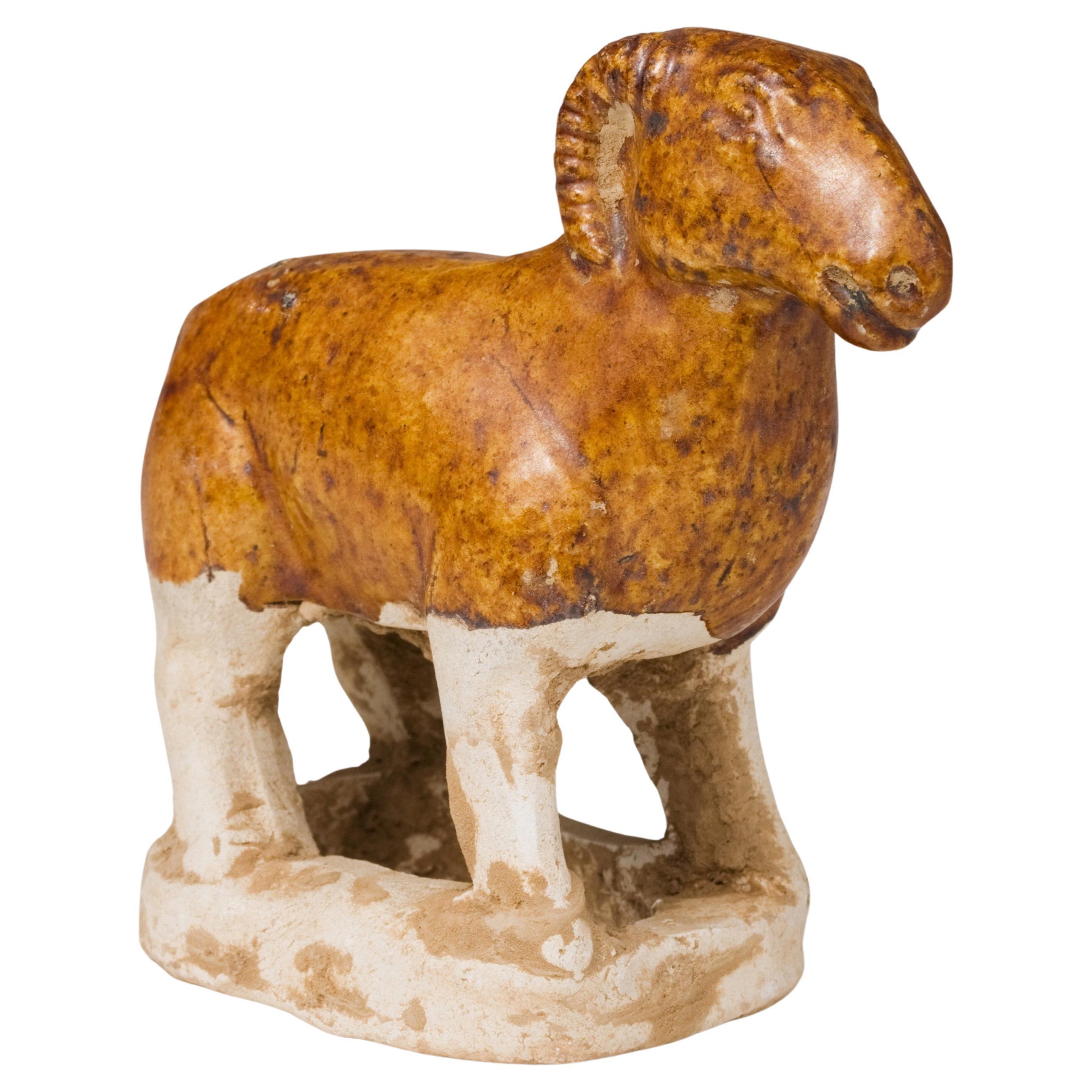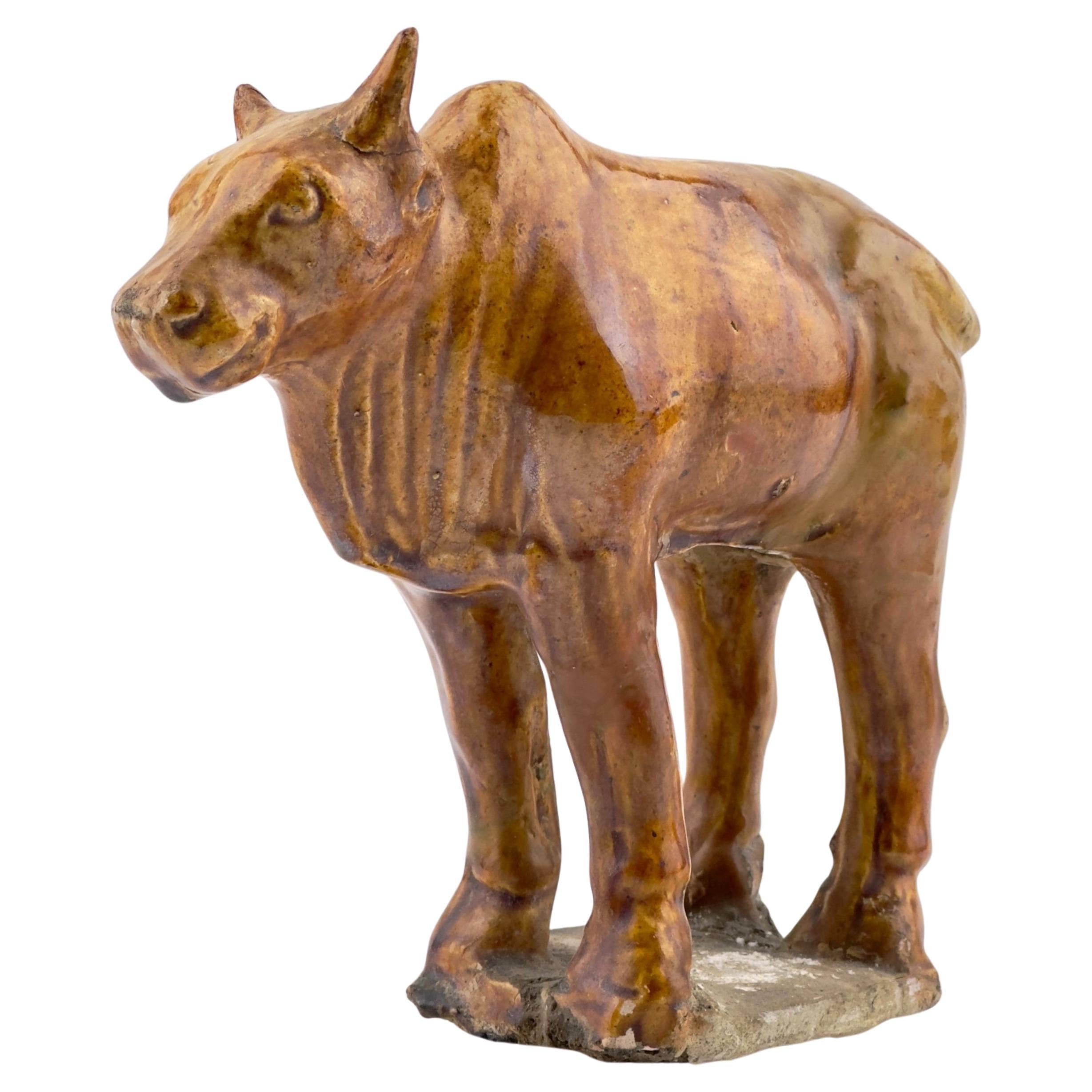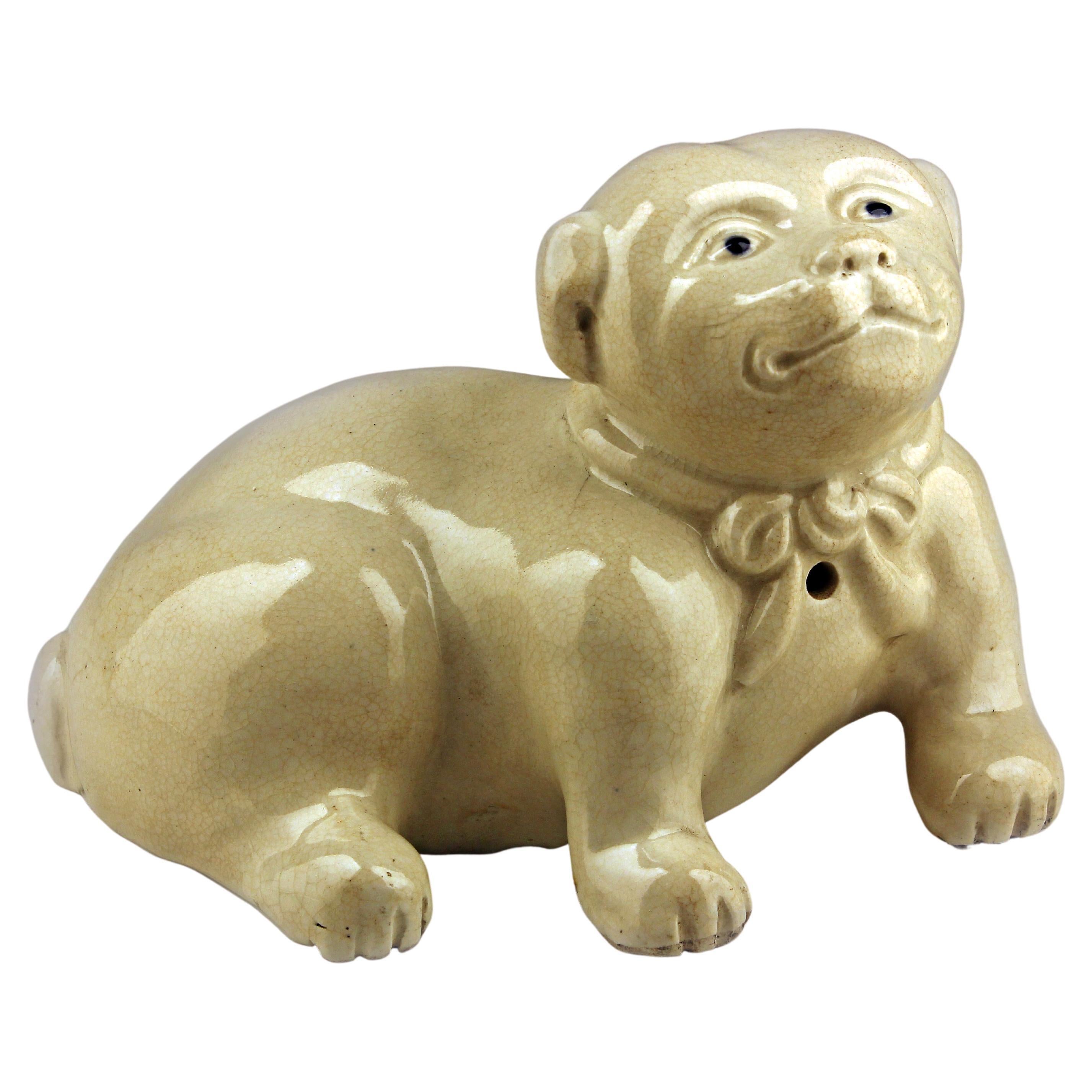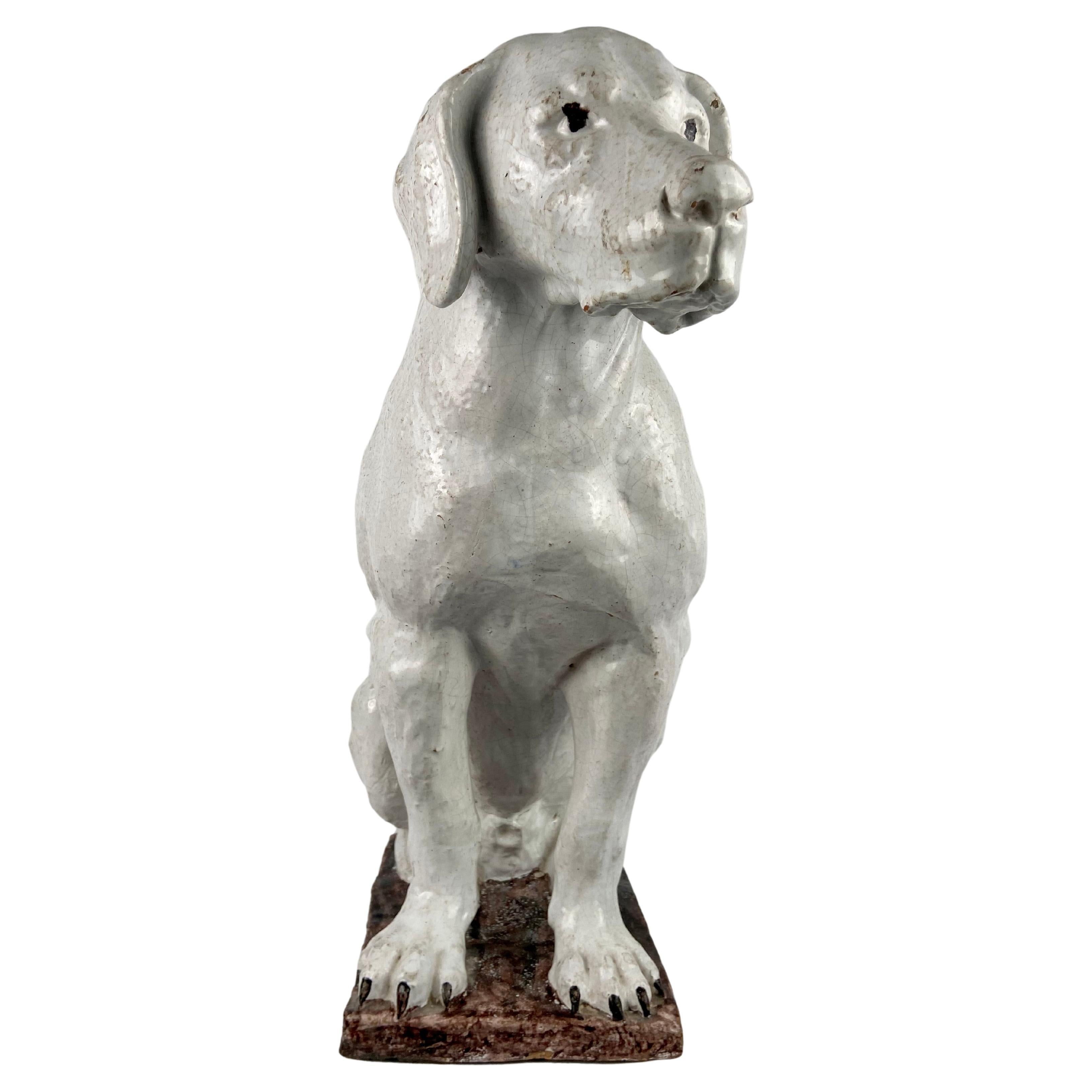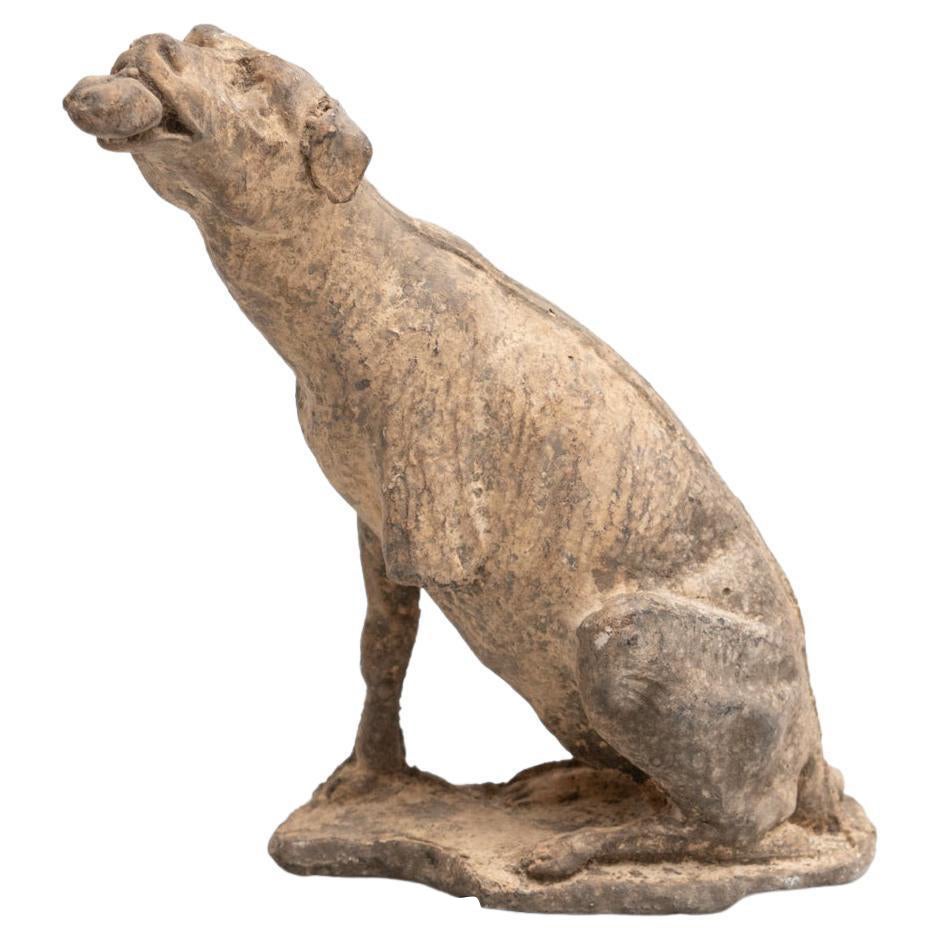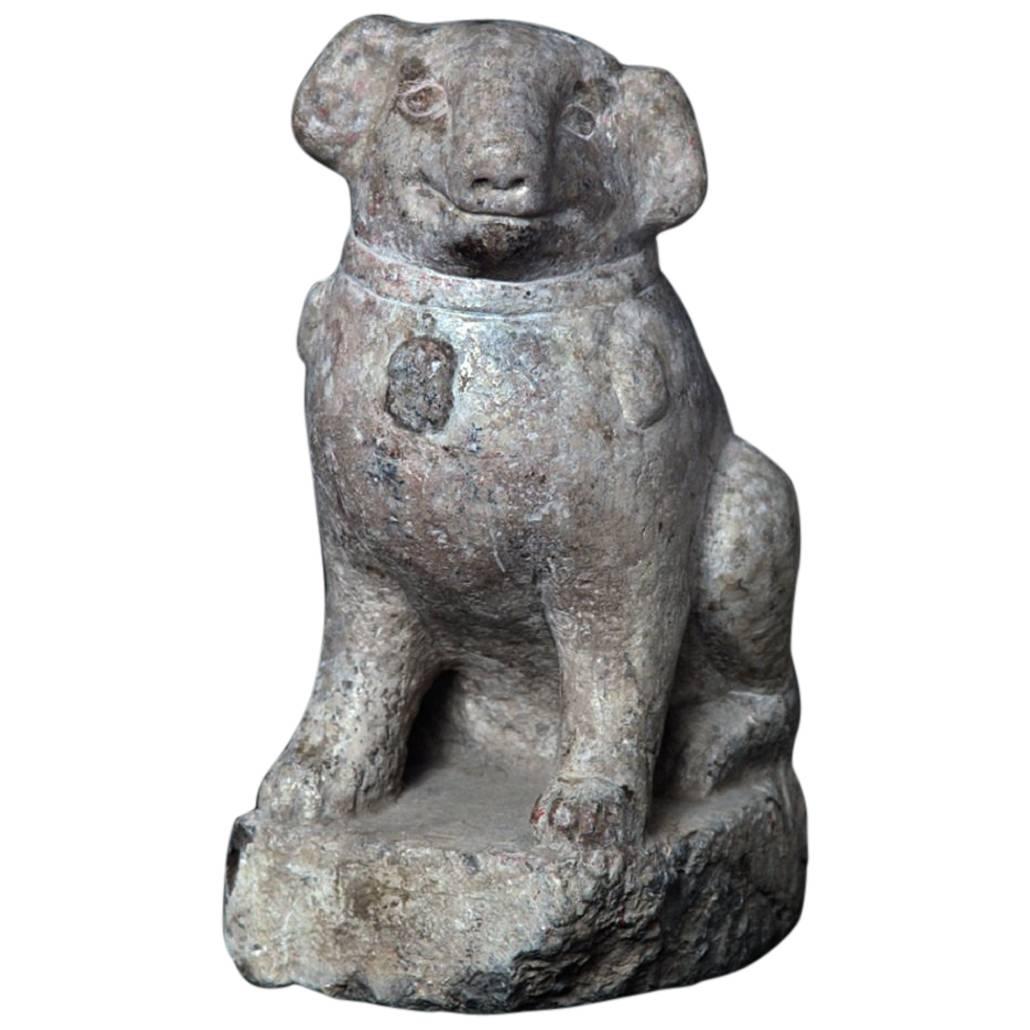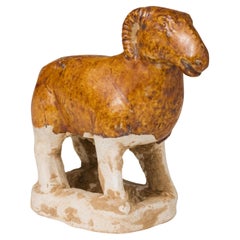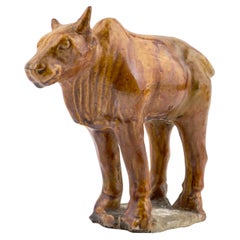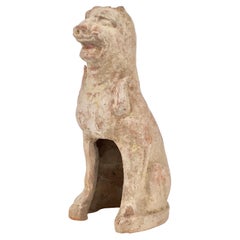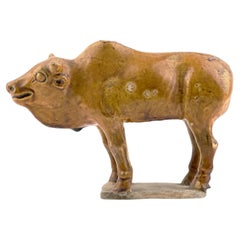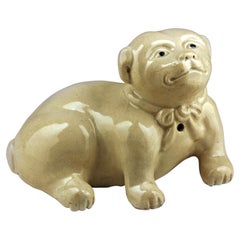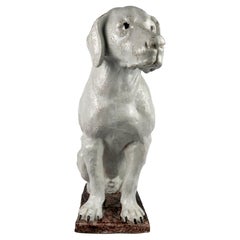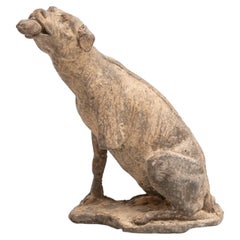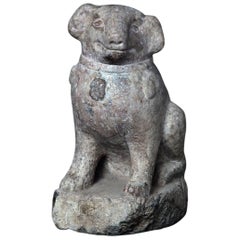Items Similar to Amber-Glazed Pottery Figure of Dog, Tang-Liao Dynasty (7-12th Century)
Want more images or videos?
Request additional images or videos from the seller
1 of 11
Amber-Glazed Pottery Figure of Dog, Tang-Liao Dynasty (7-12th Century)
$1,943.50
$2,99035% Off
£1,475.75
£2,270.3835% Off
€1,687.63
€2,596.3535% Off
CA$2,715.35
CA$4,177.4635% Off
A$3,020.06
A$4,646.2535% Off
CHF 1,576.98
CHF 2,426.1335% Off
MX$36,750.96
MX$56,539.9435% Off
NOK 20,140.48
NOK 30,985.3635% Off
SEK 18,888.22
SEK 29,058.8035% Off
DKK 12,595.39
DKK 19,377.5335% Off
Shipping
Retrieving quote...The 1stDibs Promise:
Authenticity Guarantee,
Money-Back Guarantee,
24-Hour Cancellation
About the Item
A Dog sitting on his haunches, covered in an amber glaze. Naturalistically modeled, the figure follows the artistic style of the period. It remains uncertain whether the glaze has worn off or was originally applied only partially. A similar piece housed at the New Luoyang City Museum in Henan was found unglazed, while an identical form at the Chrysler Museum of Art Gallery retains its glaze intact.
Date : Tang-Liao Dynasty(7-12TH CENTURY)
Type : chestnut-glazed pottery figure
Size : 13cm (Height), 6cm(Diameter)
Condition : Good(Minor cracks on both ears)
Provenance : Acquired in late 1990s from Hongkong
Reference :
1) Chrysler Museum of Art, Virginia, USA - Object number36.8.115 - Small Tomb Sculpture in the Form of a Seated Dog
(Type : Closely related)
2) New Luoyang City Museum, Henan, China - Tang Glazed Pottery Dog
(Type : Closely related)
* Tang Dynasty San-cai
Tang Sancai glazed pottery refers to a type of Chinese ceramic that became famous during the Tang Dynasty (618-907 AD). "Sancai" translates to "three colors," which typically are brown, green, and cream or white. Occasionally, blue was also used. These colors were achieved through the use of metallic oxides in the glaze, which, when fired at high temperatures, produced vivid colors that have retained their brilliance over centuries.
The art of Sancai pottery is characterized by its decorative and functional purposes. It includes items such as figurines, vessels, and architectural elements. Tang Sancai ceramics were often used as burial items, intended to accompany the deceased in the afterlife. The pieces frequently featured images of people, animals, and mythical creatures, reflecting the Tang Dynasty's cosmopolitan culture and the religious and mythological beliefs of the time.
The distinct look of Sancai comes from the way the glazes melt and run together, creating a flowing effect that makes each piece unique. This pottery is a valuable part of China's cultural heritage and provides insight into the sophisticated ceramic technology of the Tang Dynasty.
About the Seller
4.8
Gold Seller
Premium sellers maintaining a 4.3+ rating and 24-hour response times
Established in 1999
1stDibs seller since 2023
38 sales on 1stDibs
Typical response time: <1 hour
- ShippingRetrieving quote...Shipping from: seoul, Korea South
- Return Policy
Authenticity Guarantee
In the unlikely event there’s an issue with an item’s authenticity, contact us within 1 year for a full refund. DetailsMoney-Back Guarantee
If your item is not as described, is damaged in transit, or does not arrive, contact us within 7 days for a full refund. Details24-Hour Cancellation
You have a 24-hour grace period in which to reconsider your purchase, with no questions asked.Vetted Professional Sellers
Our world-class sellers must adhere to strict standards for service and quality, maintaining the integrity of our listings.Price-Match Guarantee
If you find that a seller listed the same item for a lower price elsewhere, we’ll match it.Trusted Global Delivery
Our best-in-class carrier network provides specialized shipping options worldwide, including custom delivery.More From This Seller
View AllAmber-Glazed Pottery Figure of Sheep, Tang-Liao Dynasty(7-12th century)
Located in seoul, KR
Naturalistically modelled, standing on a rectangular base with head facing forward, incised details and covered overall in a rich chestnut glaze save for the hooves and base.
Date :...
Category
Antique 15th Century and Earlier Hong Kong Tang Antiquities
Materials
Pottery
$3,495 Sale Price
50% Off
Amber-Glazed Pottery Figure Of Sacred Bull, Tang-Liao Dynasty (7-12th Century)
Located in seoul, KR
Naturalistically modelled, standing on a rectangular base with head facing forward and short tail curled to one side, incised details and covered overall in a rich chestnut glaze sav...
Category
Antique 15th Century and Earlier Hong Kong Tang Antiquities
Materials
Pottery
$3,990 Sale Price
50% Off
Guardian Haitai Lion Pottery Figure, Northern Wei-Tang Dynasties
Located in seoul, KR
This figure represent a guardian haitai. The style of the figurine, with its facial features and remnants of paint, suggests it could be a part of funerary art, which was common in Chinese culture during these periods.
Date : Northern Wei...
Category
Antique 15th Century and Earlier Hong Kong Tang Antiquities
Materials
Pottery, Stoneware
$1,944 Sale Price
34% Off
Amber-Glazed Pottery Figure of Sacred Bull, Tang-Liao Dynasty (7-12th Century)
Located in seoul, KR
Naturalistically modelled, standing on a rectangular base with head facing forward and short tail curled to one side, incised details and covered overall in a rich chestnut glaze sav...
Category
Antique 15th Century and Earlier Hong Kong Tang Antiquities
Materials
Pottery
$4,537 Sale Price
35% Off
Amber-Glazed Pottery Figure Of An Official, Tang-Liao Dynasty(7-12th century)
Located in seoul, KR
The figure stands with arms crossed in front, a pose that is often seen in tomb figurines which were intended to serve the deceased in the afterlife. The long robe and facial feature...
Category
Antique 15th Century and Earlier Hong Kong Tang Figurative Sculptures
Materials
Earthenware
$1,875 Sale Price
25% Off
Green Glazed Red Pottery Figure of Dog, Han dynasty (206 BC-220 AD)
Located in seoul, KR
The dog faces forward, with clearly defined eyes that stand out. Its ears are slightly curled, giving the impression of a relaxed, natural stance. The collar around its neck, connect...
Category
Antique 15th Century and Earlier Hong Kong Han Antiquities
Materials
Pottery
$2,242 Sale Price
25% Off
You May Also Like
Late 18th Century/Edo-Meiji Period Japanese Glazed Porcelain Sculpture of a Dog
Located in North Miami, FL
Late 18th century/Edo-Meiji period japanese glazed porcelain sculpture of a dog
By: unknown
Material: porcelain
Technique: molded, pressed, glazed
Dimensions: 5.5 in x 7.5 in x 5
Da...
Category
Antique Late 18th Century Japanese Edo Sculptures and Carvings
Materials
Porcelain
Dog in terracotta
Located in 'S-HERTOGENBOSCH, NL
Dog in glazed terracotta, 19th century (or before).
Labrador, presumably English.
Category
Antique 1880s English Other Animal Sculptures
Materials
Terracotta
$3,055
Plaster Traditional Dog Figure, circa 1950
Located in Barcelona, ES
Traditional plaster figure of a dog. Made in traditional Catalan atelier in Olot, Spain, circa 1950. In original condition, with minor wear consistent with age and use, preserv...
Category
Vintage 1950s Spanish Modern Animal Sculptures
Materials
Plaster
Important Ancient Chinese Effigy Pug Dog, Ming Dynasty 1368-1644
Located in South Burlington, VT
China, a carving of a canine “Pug”, Ming Dynasty, 1368-1644 CE
Dimensions: 38 cm, 15” High
Photographs taken indoors and out of doors for your viewing pleasure.
The hand carved limestone beast shown on its haunches with naturalistic joyful expression and a well defined compact head, ears, noes, eyes, feet, and tail parted to one side on reverse with distinctive collar ornament seated four square on a thick base all-over showing a weathered surface from significant age.
Formerly exhibited “Asia Week” New York City, Fuller Building, Hutton Gallery 2006.
Provenance: ex collection luoyang, Henan Province, China.
Includes custom display base as shown
Catalog reference: 35 years collecting 35 treasures, Number 35, p.76 (photo)
In ancient China, it is a well-known fact that several types of small dogs were bred and were favored pet gifts between emperors and kings including Lion Dogs, Pekingese and Lo-sze breeds. Some Lo-sze are pictured wearing collars with bells a frequent combination fancied by European royalty of the seventeenth and eighteenth centuries. Lo-sze or pugs were prized for their compact body, good bones, flat face, square jaw, short coat, curled tail, side set back ears, and temperate disposition.
History:
Placing stone animals in important tombs can be traced back at least to the Qin Dynasty (221-206 BCE), some two thousand years ago. In ancient times, stone animals and human figures placed before imperial tombs symbolized royal power and privilege in addition to decorative functions.
The first Ming tomb...
Category
Antique 15th Century and Earlier Chinese Ming Sculptures and Carvings
Materials
Limestone
$6,800 Sale Price
20% Off
Chinese Porcelain Dog from the 20th Century
Located in Lisboa, PT
Chinese porcelain dog from the 20th century.
Category
20th Century Animal Sculptures
Materials
Porcelain
Sculpture Dog Sichuan Pottery Han Dynasty Period China
Located in New York, NY
Sculpture Sichuan pottery walking Han dynasty period, China. A Han sculpture in the shape of a dog. Of the large number of figurines unearthed in burial sites in the city, pottery dogs are among the most unique. These marvelous animated tomb figurines...
Category
Antique 15th Century and Earlier Chinese Han Animal Sculptures
Materials
Pottery
More Ways To Browse
12th Century
Gallery 7
12th Century Furniture
Green And White Pottery
Glazed Dog
Antique Dog House
Chinese Green Glazed Pottery
Chinese Glazed Figure
Green Asian Vessels
Metallic Pottery
Chinese Amber
Tomb Figure
Chinese Seated Figure
Chinese Pottery Figure
Green And Cream Pottery
Antique Chinese Figurines
Virginia Galleries Furniture
White Dog Ceramic
